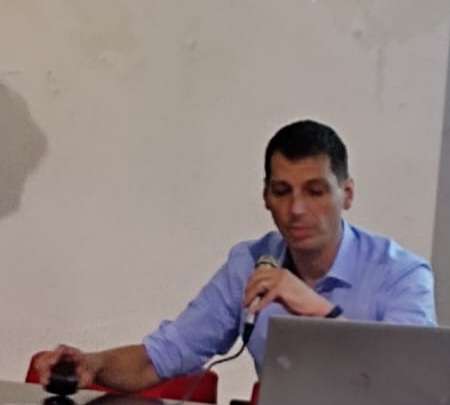Studying at the University of Verona
Here you can find information on the organisational aspects of the Programme, lecture timetables, learning activities and useful contact details for your time at the University, from enrolment to graduation.
Academic calendar
The academic calendar shows the deadlines and scheduled events that are relevant to students, teaching and technical-administrative staff of the University. Public holidays and University closures are also indicated. The academic year normally begins on 1 October each year and ends on 30 September of the following year.
Course calendar
The Academic Calendar sets out the degree programme lecture and exam timetables, as well as the relevant university closure dates..
| Period | From | To |
|---|---|---|
| CuCi IA | Sep 21, 2020 | Oct 31, 2020 |
| CuCi IB | Nov 9, 2020 | Jan 9, 2021 |
| CuCi IIA | Feb 15, 2021 | Apr 1, 2021 |
| CuCi IIB | Apr 14, 2021 | May 29, 2021 |
| Session | From | To |
|---|---|---|
| sessione d'esame invernale CuCi | Jan 11, 2021 | Feb 13, 2021 |
| sessione d'esame estiva CuCi | Jun 7, 2021 | Jul 24, 2021 |
| sessione d'esame autunnale CuCi | Aug 23, 2021 | Sep 18, 2021 |
| Session | From | To |
|---|---|---|
| sessione di laurea invernale 19-20 | Apr 7, 2021 | Apr 13, 2021 |
| sessione di laurea estiva 20-21 | Jul 5, 2021 | Jul 10, 2021 |
| Sessione autunnale di laurea a.a. 2020/21 | Nov 8, 2021 | Nov 13, 2021 |
| Sessione straordinaria di laurea a.a. 2020/21 | Mar 28, 2022 | Apr 2, 2022 |
| Period | From | To |
|---|---|---|
| Festa di Ognissanti | Nov 1, 2020 | Nov 1, 2020 |
| Chiusura Ateneo ponte Immacolata | Dec 7, 2020 | Dec 7, 2020 |
| Festa dell'Immacolata | Dec 8, 2020 | Dec 8, 2020 |
| Vacanze di Natale | Dec 24, 2020 | Jan 6, 2021 |
| Vacanze di Pasqua | Apr 2, 2021 | Apr 6, 2021 |
| Festa della liberazione | Apr 25, 2021 | Apr 25, 2021 |
| Festa del lavoro | May 1, 2021 | May 1, 2021 |
| Festa del Santo Patrono | May 21, 2021 | May 21, 2021 |
| Sospensione delle lezioni | May 22, 2021 | May 22, 2021 |
| Festa della Repubblica | Jun 2, 2021 | Jun 2, 2021 |
| Vacanze estive | Aug 9, 2021 | Aug 15, 2021 |
Exam calendar
Exam dates and rounds are managed by the relevant Culture and Civilisation Teaching and Student Services Unit.
To view all the exam sessions available, please use the Exam dashboard on ESSE3.
If you forgot your login details or have problems logging in, please contact the relevant IT HelpDesk, or check the login details recovery web page.
Should you have any doubts or questions, please check the Enrollment FAQs
Academic staff

Bassetti Massimiliano
 massimiliano.bassetti@univr.it
massimiliano.bassetti@univr.it
 045802 8376
045802 8376
 riccardo.bertolazzi@univr.it
riccardo.bertolazzi@univr.it
 francesco.bianchi@univr.it
francesco.bianchi@univr.it
 evita.calabrese@univr.it
evita.calabrese@univr.it
 piergiovanna.grossi@univr.it
piergiovanna.grossi@univr.it
 elisa.lerco@univr.it
elisa.lerco@univr.it
 francesco.lupi@univr.it
francesco.lupi@univr.it
Maganuco Anna Maria Grazia Rita
 anna.maganuco@univr.it
anna.maganuco@univr.it

Mastrocinque Attilio
 attilio.mastrocinque@univr.it
attilio.mastrocinque@univr.it
 +39 045802 8386
+39 045802 8386
 giulia.pedrucci@univr.it
giulia.pedrucci@univr.it
 giulia.perosa@univr.it
giulia.perosa@univr.it
 dino.piovan@univr.it
dino.piovan@univr.it
 alberto.scandola@univr.it
alberto.scandola@univr.it
 massimo.scotti@univr.it
massimo.scotti@univr.it
 cecilia.sideri@univr.it
cecilia.sideri@univr.it
 carlo.vannini@accademiabelleartiverona.it
carlo.vannini@accademiabelleartiverona.it
 giovanna.zoccarato@univr.it
giovanna.zoccarato@univr.it
Study Plan
The Study Plan includes all modules, teaching and learning activities that each student will need to undertake during their time at the University.
Please select your Study Plan based on your enrollment year.
1° Year
| Modules | Credits | TAF | SSD |
|---|
1 module to be chosen among the following2° Year activated in the A.Y. 2021/2022
| Modules | Credits | TAF | SSD |
|---|
Latin literature (i)
2 modules to be chosen among the following1 module to be chosen among the following2 modules to be chosen among the following3° Year activated in the A.Y. 2022/2023
| Modules | Credits | TAF | SSD |
|---|
2 modules to be chosen among the following1 module to be chosen among the following1 module to be chosen among the following| Modules | Credits | TAF | SSD |
|---|
1 module to be chosen among the following| Modules | Credits | TAF | SSD |
|---|
Latin literature (i)
2 modules to be chosen among the following1 module to be chosen among the following2 modules to be chosen among the following| Modules | Credits | TAF | SSD |
|---|
2 modules to be chosen among the following1 module to be chosen among the following1 module to be chosen among the following| Modules | Credits | TAF | SSD |
|---|
Legend | Type of training activity (TTA)
TAF (Type of Educational Activity) All courses and activities are classified into different types of educational activities, indicated by a letter.
Latin literature (i) [Indirizzo moderno] (2021/2022)
Teaching code
4S01353
Teacher
Coordinator
Credits
6
Language
Italian
Scientific Disciplinary Sector (SSD)
L-FIL-LET/04 - LATIN LANGUAGE AND LITERATURE
Period
1 A dal Sep 27, 2021 al Nov 6, 2021.
Learning outcomes
The course aims to provide the students with the principal features of Latin literature, both with reference to its historical development, literary genres and rules, and to the knowledge of some selected works.
Prerequisites: Basic knowledge of Latin language.
INDIRIZZO ANTICO
Learning outcomes: at the end of teaching students are supposed to have: - main knowledge of Latin language (phonetics, morphology, syntax), prosody and textual criticism; - autonomous skills in comprehension, translation and interpretation of the proposed texts; - autonomous skills for a philological, linguistic, and historical and literary analysis of the proposed texts; - main skills for a metrical analysis of the proposed texts in the most common metres; - skills for an interpretation of the proposed texts with reference to their historical and literary background; - to present the teaching topics in a proper way, with a clear and well organised exposition; - to connect the teaching topics to the main framework of the history of Latin literature and to the specific features of literary genres; - to develop an autonomous reflection and analysis of Latin proposed texts; - to have an appropriate methodology for the study of literary Latin texts.
INDIRIZZO MODERNO
Expected learning outcomes: at the end of the course students will be able to: -know phonetics, morphology and basic syntax of the Latin language; -know the essential features of Latin literature, with special regard to literary genres; -understand, translate and analyse the texts chosen for the course; -develop autonomous comprehension and interpretation skills, with regard to the cultural and historical-literary context of the chosen passages; -improve the following communication skills by translating the texts: to practice a metalinguistic reflection; to improve and expand the specialized lexicon of the historical-literary language, as well as the basic Latin vocabulary; -develop autonomous ability to reflect on the interaction between tradition and innovation in literary genres, as well as in linguistic and cultural heritage.
Program
Prerequisites: Basic knowledge of the Latin language.
Students who need to acquire or improve the basic knowledge of phonetics, morphology and Latin syntax required as a prerequisite are requested to attend the “Laboratorio di Latino”.
-Reading and discussion of a choice of Latin texts.
-Introduction to the study of Latin literature: cultural conditions and literary genres;
-Lexical issues (key-words in Latin culture).
-Introduction to Cicero, Catilinariae.
Texts:
1. A. Cavarzere-A. De Vivo-P. Mastandrea, Letteratura latina. Una sintesi storica, Roma, Carocci, 2003.
2. A. Traina-G. Bernardi Perini, Propedeutica al latino universitario, Bologna, Pàtron, 1998: chapters I-IV.
3. Reading, understanding and translation of a Latin text of your choice between the following options:
a) Cicerone, Le Catilinarie. Introduzione, traduzione e note di Lidia Storoni Mazzolani; premessa al testo di Salvatore Rizzo, Milano 1985 (o ristampe successive): è richiesta la traduzione delle Catilinarie I-II-III.
b) Sallustio, La guerra contro Giugurta, traduzione e note di L.Piazzi, introduzione di G.Brescia, Siena 2006: è richiesta la traduzione dei §§ 1-45 e 84-86.
Optional learning activities concerning translation exercises will support students who need to acquire or improve their ability to translate and analyze the texts chosen for the course.
N.B. Non-attending students are requested to contact the teacher in due advance so as to define a specific program.
Bibliography
Examination Methods
The exam consists of an oral test aiming to verify the level of achievement of the learning objectives previously indicated; namely, the acquisition of autonomous skills to read, understand and translate the previously specified Latin texts with special regard to
-the basic knowledge of Latin phonetics, morpho-syntactic and lexical structures;
-the knowledge of the essential features of Latin literature;
-the ability to understand the cultural, historical - literary context of the chosen passages;
-argument skills; wealth and appropriateness of vocabulary.
Type D and Type F activities
| years | Modules | TAF | Teacher |
|---|---|---|---|
| 1° 2° 3° | Dialogoi. Interdepartmental seminar on the texts of philosophy and ancient literature | F |
Gherardo Ugolini
(Coordinator)
|
| 1° 2° 3° | Fondamenti per introduzione allo studio del linguaggio | F |
Federico Righi
(Coordinator)
|
| 1° 2° 3° | Giornata mondiale della poesia | F |
Arnaldo Soldani
(Coordinator)
|
| 1° 2° 3° | The Unesco World Heritage Sites | F |
Silvana Bianchi
(Coordinator)
|
| 1° 2° 3° | Il testo en abyme: rappresentazioni della scrittura nell’Europa romantica - Convegno internazionale del CRIER - 5-6 novembre 2020 | F |
Corrado Viola
(Coordinator)
|
| 1° 2° 3° | Intercomprehension laboratory between the Romance languages | F |
Alessandra Zangrandi
(Coordinator)
|
| 1° 2° 3° | Laboratory to introduce the study of Ancient Greek | F |
Dino Piovan
(Coordinator)
|
| 1° 2° 3° | Books and writings of the Greek world | F |
Paolo Scattolin
(Coordinator)
|
| years | Modules | TAF | Teacher |
|---|---|---|---|
| 1° 2° 3° | The origins of Christianity | F |
Giannattilio Bonifacio
(Coordinator)
|
| years | Modules | TAF | Teacher |
|---|---|---|---|
| 1° 2° 3° | Convegno su carlo gozzi nel terzo centenario della nascita | F |
Nicola Pasqualicchio
(Coordinator)
|
| 1° 2° 3° | Dialogoi. Interdepartmental seminar on the texts of philosophy and ancient literature | F |
Gherardo Ugolini
(Coordinator)
|
| 1° 2° 3° | Fondamenti per introduzione allo studio del linguaggio | F |
Federico Righi
(Coordinator)
|
| 1° 2° 3° | Intercomprehension laboratory between the Romance languages | F |
Alessandra Zangrandi
(Coordinator)
|
| 1° 2° 3° | Laboratory to introduce the study of Ancient Greek | F |
Dino Piovan
(Coordinator)
|
| 1° 2° 3° | Laboratorio di metrica italiana | F |
Giovanna Zoccarato
(Coordinator)
|
| 1° 2° 3° | Books and writings of the Greek world | F |
Paolo Scattolin
(Coordinator)
|
| years | Modules | TAF | Teacher |
|---|---|---|---|
| 1° 2° 3° | The origins of Christianity | F |
Giannattilio Bonifacio
(Coordinator)
|
| years | Modules | TAF | Teacher |
|---|---|---|---|
| 1° 2° 3° | Antifascismo/i, un percorso in quattro profili | F |
Renato Camurri
(Coordinator)
|
| 1° 2° 3° | Lectures "Musiche/Culture/Civiltà" | F |
Vincenzo Borghetti
(Coordinator)
|
| 1° 2° 3° | Dialogoi. Interdepartmental seminar on the texts of philosophy and ancient literature | F |
Gherardo Ugolini
(Coordinator)
|
| 1° 2° 3° | Educational workshop on bibliotherapy | F |
Marco Dalla Valle
(Coordinator)
|
| 1° 2° 3° | Laboratory of photo | F |
Carlo Vannini
(Coordinator)
|
| 1° 2° 3° | Intercomprehension laboratory between the Romance languages | F |
Alessandra Zangrandi
(Coordinator)
|
| 1° 2° 3° | Laboratory to introduce the study of Ancient Greek | F |
Dino Piovan
(Coordinator)
|
| 1° 2° 3° | Workshop on akkadian language | F |
Simonetta Ponchia
(Coordinator)
|
| 1° 2° 3° | Opera Workshop | F |
Nicola Pasqualicchio
(Coordinator)
|
| 1° 2° 3° | Language and culture of Ancient Anatolia and the Hittites | F |
Federico Giusfredi
(Coordinator)
|
| years | Modules | TAF | Teacher |
|---|---|---|---|
| 1° 2° 3° | Attivita' FAI | F |
Monica Molteni
(Coordinator)
|
| 1° 2° 3° | Workshop on Latin texts translation | - |
Renata Raccanelli
(Coordinator)
|
| 1° 2° 3° | Workshop on Latin texts translation | - |
Renata Raccanelli
(Coordinator)
|
| 1° 2° 3° | Latin Prosody exercises | - |
Paolo De Paolis
(Coordinator)
|
| 1° 2° 3° | Organizzazione e stesura della tesi triennale su temi letterari | - |
Giuseppe Sandrini
(Coordinator)
|
Career prospects
Module/Programme news
News for students
There you will find information, resources and services useful during your time at the University (Student’s exam record, your study plan on ESSE3, Distance Learning courses, university email account, office forms, administrative procedures, etc.). You can log into MyUnivr with your GIA login details: only in this way will you be able to receive notification of all the notices from your teachers and your secretariat via email and soon also via the Univr app.
Graduation
List of theses and work experience proposals
| theses proposals | Research area |
|---|---|
| tesi di Glottologia, Storia comparata, Linguistica storica | ENGLISH LANGUAGE - Grammar and Syntax – Grammatik und Syntax |
| tesi di Glottologia, Storia comparata, Linguistica storica | GERMANIC LANGUAGE - Dialectology - Dialektologie |
| tesi di Glottologia, Storia comparata, Linguistica storica | HUMANITIES & SOCIAL STUDIES - HUMANITIES & SOCIAL STUDIES |
| tesi di Glottologia, Storia comparata, Linguistica storica | Indo-European languages & literatures - Indo-European languages & literatures |
| tesi di Glottologia, Storia comparata, Linguistica storica | LINGUISTICS - LINGUISTICS |
| Stage | Research area |
|---|---|
| Lavorare in archivio | Various topics |
| L'iter del libro in biblioteca | Various topics |
Gestione carriere
Linguistic training CLA
Student mentoring
Requisiti classi di abilitazione insegnamento
Requisiti necessari per accedere alle classi di abilitazione per l'insegnamento.
vedi allegato pdf
Inoltre, per informazioni sui 24 CFU nelle discipline antropo-psico-pedagogiche e nelle metodologie e tecnologie didattiche, si veda -> LINK
Documents
| Title | Info File |
|---|---|
|
|
pdf, it, 307 KB, 30/11/21 |





























































